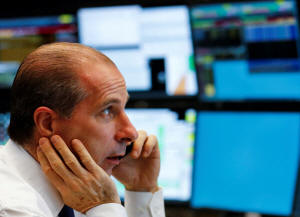Dollar hits 2-month low before US inflation data
 Send a link to a friend
Send a link to a friend
 [July 12, 2023] By
Marc Jones [July 12, 2023] By
Marc Jones
LONDON (Reuters) - Bets on a screeching slowdown in U.S. inflation data
later saw traders shove the dollar to a 2-month low on Wednesday and
push stocks up and bond market borrowing costs down for a third day
running.
Economists polled by Reuters expect to see June U.S. consumer price
inflation slow to 3.1% from 4% in May, which might be enough to convince
the Federal Reserve to end its aggressive rate hikes - if not this
month, at least soon.
Europe's main stock markets had opened 0.7% higher, led once again by
the high-flying tech sector, and MSCI's main 47-country world index was
up a full 20% from rate hike-induced lows hit in October.
The currency market was moving too. The dollar's low meant it notched
its longest losing stretch since March. The yen clambered back above 140
and sterling hit a 15-month high as the Bank of England said the UK was
coping with higher interest rates. [/FRX][GVD/EUR]
"Risk assets, as usual, seem to take the best out of whatever is
happening." said James Athey, an investment director and fund manager
Abrdn in London.
For the CPI data, the core reading which strips out volatile elements
such as energy prices, will matter the most for markets, he added.

"If it doesn't give the impression of the immediate cessation of these
price pressures we could see a reversal of some of these more recent
market moves," Athey said, such as the rebound in the yen and drop in
short-term U.S. bond yields.
That core rate is expected to have dropped for a third month to 5% from
5.3%, according to the Reuters poll, though that is more than double the
Fed's 2% target.
Markets are pricing in a 92% chance of a 25-basis-point Fed hike later
this month, the CME FedWatch tool showed, but remain doubtful of further
hikes after that.
Wednesday's moves saw euro zone bond yields inch lower, with Germany's
10 year yield dipping to 2.62%, having hit a four-month high of 2.679%
on Monday. U.S. Treasury yields were a touch lower as well, with the
10-year Treasury yield now at 3.95%.

Saxo Markets strategists said traders were likely to continue to keep
the odds for September and November rate hikes low if the core inflation
rate decelerates as anticipated.
Investor attention will also be on the Bank of Canada, with analysts
expecting a second consecutive quarter-point rate hike at its upcoming
meeting.
[to top of second column] |

A trader works at the Frankfurt stock
exchange, amid the coronavirus disease (COVID-19) outbreak, in
Frankfurt, Germany, December 30, 2020. REUTERS/Ralph Orlowski

In June, the central bank raised its overnight rate to a 22-year
high of 4.75% after a five-month pause, saying monetary policy was
not restrictive enough. It then said further moves would depend on
economic data.
LINGERING FEAR
A speech by Bank of England governor Andrew Bailey was on the watch
list as well, though this will be about financial stability so may
have little impact on expectations for monetary policy.
"The great lingering fear among central banks is that the longer it
takes to bring down inflation, the greater the risk of it becoming
entrenched," Betashares chief economist David Bassanese said in a
note.
Overnight in Asia, Australia's S&P/ASX 200 index rose 0.4%, while
the bouncing yen knocked Japan's Nikkei down 0.8%.
Hong Kong's Hang Seng Index rose 1% whereas bluechip Chinese shares
fell 0.7% as tech stocks there jolted 2.5% lower amid renewed
concerns about Beijing's attitude to the sector.
In the U.S., futures were pointing to a higher start for Wall Street
later. The Q2 earnings start to roll in this week, with heavyweight
banks JPMorgan, Citigroup and Wells Fargo kicking things off as
usual.
Wall Street banks overall are expected to report higher profits as
rising interest payments offset a downturn in dealmaking.
Back in the currency market, the dollar index, was down 0.25% at
101.47 as Europe got into its stride.
The yen's continued ascent took it to 139.59 per dollar and meant it
has risen nearly 4% from a seven-month low of 145.07 last month, a
level that had put traders on alert for possible intervention from
Japanese authorities. [/FRX]
The New Zealand dollar was up 0.26% in choppy trading after the
country's central bank kept interest rates unchanged at 5.50%. The
euro rose to $1.1027, the pound hit $1.2970 while the Swiss franc
hit a 2-1/2 year high of 0.8765.
Among commodities, Brent oil futures were up 0.4% at $79.70 per
barrel, U.S. crude rose 0.3% to $75.07 and gold inched up to a near
3-week high of $1,934.5 an ounce. [O/R]
(Additional reporting by Ankur Banerjee in Singapore; Editing by
Mark Potter)
[© 2023 Thomson Reuters. All rights
reserved.]
This material may not be published,
broadcast, rewritten or redistributed.
Thompson Reuters is solely responsible for this content. |